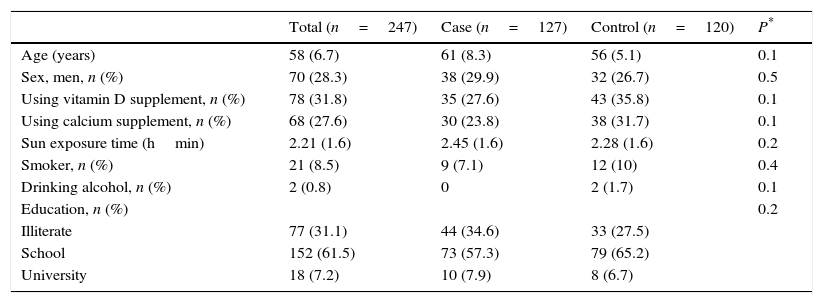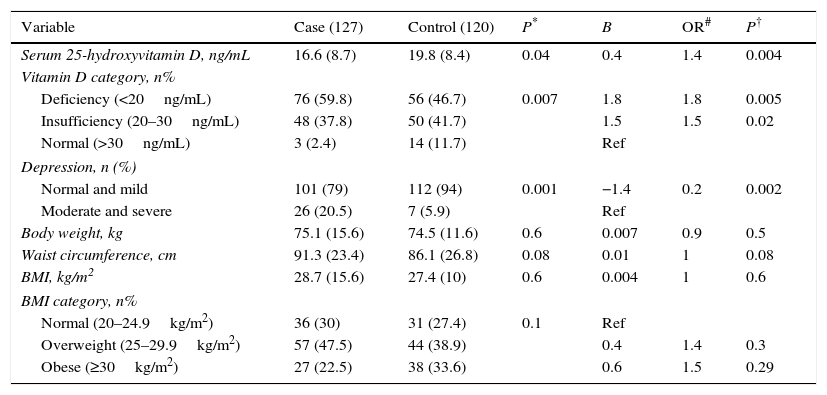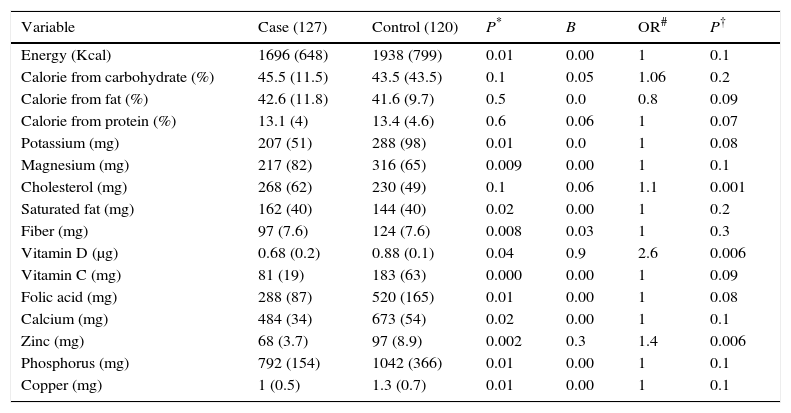We investigated vitamin D status, body size, nutritional intake and depression status in hypertensive patients in the north of Iran that have special dietary habit and lifestyle according to their culture and geographical situation.
Materials and methodsThis study was conducted on 127 patients with newly recognized hypertension and the 120 normal participants, in the north of Iran. Anthropometric data was measured and demographic characteristics, dietary intake, depression and medical status were collected by valid questionnaires. Blood samples were measured for 25-hydroxyvitamin D.
ResultsHypertensive patients had significantly lower serum 25-hydroxyvitamin D than control group (16±8.7ng/mL vs. 19.8±8.4ng/mL; P=0.04). In adjusted model, serum 25-hydroxyvitamin D of less than 30ng/mL was associated with an almost 4-fold odds of hypertension. The odds of hypertension in depressed patients was 1.2 times higher than in those without depression (p=0.002). After adjusted logistic regression analysis for energy intake, significant association was observed between hypertension and some dietary nutrients, including cholesterol, fiber and vitamin D intake. There was no significant association between hypertension and body weight, waist circumference as well as BMI.
ConclusionThe vitamin D status was lower in the most individuals and it causes a considerable increase in the risk of hypertension. Undesirable intake of some nutrients and depression also increase the risk of developing hypertension. Health training about suitable dietary habits, easier access to vitamin D supplementation and screening for depression in patients with hypertension are cost-effective tools to improve outcomes in Iran.
Se investigó el nivel de vitamina D, el tamaño corporal, la ingesta nutricional y el estado depresivo en pacientes hipertensos del Norte de Irán con unos hábitos alimenticios y estilo de vida especiales en función de su cultura y localización geográfica.
Material y métodoEl presente estudio se llevó a cabo en el Norte de Irán, con 127 pacientes recién diagnosticados de hipertensión y 120 individuos normales. Se midieron datos antropométricos y características demográficas, ingesta nutricional, depresión y estado médico por medio de cuestionarios válidos. Se analizaron los valores sanguíneos de 25-hidroxivitamina D.
ResultadosLos pacientes hipertensos presentaron unos valores significativamente inferiores de 25-hidroxivitamina D que los del grupo de control (16±8,7ng/ml vs. 19,8±8,4ng/ml; p=0,04). En el modelo ajustado los valores de 25-hidroxivitamina D inferiores a 30ng/ml se asociaron con una probabilidad hasta 4 veces mayor de padecer hipertensión. La probabilidad en los pacientes con depresión fue 1,2 veces más alta que en los pacientes no depresivos (p=0,002). Después de realizar una regresión logística ajustada y analizar la ingesta energética se apreció una asociación significativa entre la hipertensión y algunos nutrientes alimenticios como el colesterol, la fibra y la ingesta de vitamina D. No existió una asociación significativa entre la hipertensión y el peso corporal, el perímetro de la cintura ni el IMC.
ConclusiónLos niveles de vitamina D eran más bajos en la mayoría de individuos, y esto ocasiona un aumento considerable del riesgo de padecer hipertensión. La ingesta inapropiada de algunos nutrientes y la depresión también incrementan el riesgo de hipertensión. La formación sanitaria sobre hábitos alimenticios saludables, un mayor acceso a los suplementos de vitamina D y la detección de la depresión en pacientes hipertensos son herramientas económicamente rentables que mejorarán los resultados en Irán.








